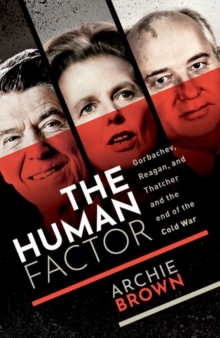Description
| Product ID: | 9780192856531 |
| Product Form: | Paperback / softback |
| Country of Manufacture: | GB |
| Title: | The Human Factor |
| Subtitle: | Gorbachev, Reagan, and Thatcher and the End of the Cold War |
| Authors: | Author: Archie Brown |
| Page Count: | 528 |
| Subjects: | European history, European history, History of the Americas, History, Cold wars and proxy conflicts, International relations, History of the Americas, Postwar 20th century history, from c 1945 to c 2000, The Cold War, International relations, c 1945 to c 2000 (Post-war period) |
| Description: | Select Guide Rating The Human Factor tells the dramatic story about the part played by political leaders - particularly the three very different personalities of Gorbachev, Reagan and Thatcher - in ending the standoff that threatened the future of all humanity. How the Cold War ended - and the people who made it happenIn this penetrating analysis of the role of political leadership in the Cold War''s ending, Archie Brown shows why the popular view that Western economic and military strength left the Soviet Union with no alternative but to admit defeat is wrong. To understand the significance of the parts played by Mikhail Gorbachev, Ronald Reagan and Margaret Thatcher in East-West relations in the second half of the 1980s, Brown addresses several specific questions: What were the values and assumptions of these leaders, and how did their perceptions evolve? What were the major influences on them? To what extent were they reflecting the views of their own political establishment or challenging them? How important for ending the East-West standoff were their interrelations? Would any of the realistically alternative leaders of their countries at that time have pursued approximately the same policies? The Cold War got colder in the early 1980s and the relationship between the two military superpowers, the USA and the Soviet Union, each of whom had the capacity to annihilate the other, was tense. By the end of the decade, East-West relations had been utterly transformed, with most of the dividing lines -including the division of Europe- removed. Engagement between Gorbachev and Reagan was a crucial part of that process of change. More surprising was Thatcher''s role. Regarded by Reagan as his ideological and political soulmate, she formed also a strong and supportive relationship with Gorbachev (beginning three months before he came to power). Promoting Gorbachev in Washington as a man to do business with, she became, in the words of her foreign policy adviser Sir Percy Cradock, an agent of influence in both directions. |
| Imprint Name: | Oxford University Press |
| Publisher Name: | Oxford University Press |
| Country of Publication: | GB |
| Publishing Date: | 2022-03-24 |


